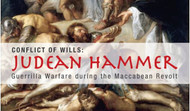Interview with Robin David
Posted by Tim Densham on 20th Feb 2021
Hello Catastrophe World! Here is an interview I had with the designer of Judean Hammer, Robin David:
Tell us about your game design history:
Hi Tim. I've been designing games as a hobby for he past six years or so and kind of bounce around all over the place with whatever themes or mechanics I find interesting at the time. I've self-published quite a few games – releasing physical games through Kickstarter and a good number of downloadable print-and-play games. My biggest game has probably been Movable Type, a card-drafting word game, which won a number of awards and was then rereleased in 2020 by Osprey Games as Letterpress. I'm also currently in the manufacturing process for Luzon Rails, which is a cube-rails game I funded on Kickstarter last year. You can see some more of my games on my website (robin-david.com)
What on earth made you decide to make an historical game?
I've been an player of historical games for some time but I suppose I felt a little intimidated by the idea of designing one myself. When I finally dipped my toe into designing some wargames, I found them really satisfying. I really felt that they “spoke to me” in a different way than Eurogames. I'm really interested in asymmetric warfare and find that most of my historical game designs have a focus on that.
In 2019, I spent a good amount of time working on a card-driven game about Edward Bruce's invasion of Ireland, but the pandemic forced onto the backburner – it's a game strictly for four players, which forces players into strange and uneasy alliances. Players take roles as the Scottish, the Gaelic Irish, the Anglo-Irish, and the English. The English and the Scots are massive forces, constantly fighting, while the two Irish factions sometimes help each other, sometimes help their foreign-ally, and sometimes try to undermine that same power.
I designed Judean Hammer in early 2020 but had been mulling over the ideas for some time. The Judean Revolt is one of the BIG asymmetric conflicts of history and I was surprised that it hasn't been covered very much in the tabletop game space. It's a really interesting conflict because, even though the Judeans were at a significant disadvantage, they leveraged what they did have to massive effect and won – kicking the Seleucid Greeks out of Judea and gaining independence for a century. That's a really fascinating story! So I knew I wanted to make a game out of that one day! I just needed to find the right mechanics to express the story...
What is different about designing an historical game from a traditional game?
In a historical game, there is definitely an emphasis on the simulation value and rules are allowed to be a little more complex to compensate for that. With traditional boardgaming, the best designs try to be streamlined with as few exceptions to rules as possible. I've tried to reach a compromise between those two aims in Judean Hammer, which aims for historical accuracy while keeping the rules burden low.
What was the biggest hurdle you had to vault when you made this design?
Judean Hammer was quite a painless design. I decided on the historical setting first and knew that I wanted to make a card-driven game with it – both because I like CDGs and because they let the designer shift some of the complexity from the rules to the cards. The deck management mechanic was there from the very first iteration and just needed some tweaking and refining.
I should explain the deck management mechanic briefly! When you perform an event on a card (which is usually the most powerful way to use a card), it is removed from the game. But if you take a weaker recruit or move action, the card gets shuffled back into the shared deck and will come back later. So far so good. But when you have a battle, the first thing that you do is flip a card off that shared deck and apply the battle modifier printed on that card. If you played all your events, then you would have a board advantage from all those powerful events but you would get completely hosed in many fights because none of your modifiers are left in the deck.
If you play one of your opponent's cards, then you have to use it for recruiting or moving, but then your opponent can play the event – so there's a tension of knowing you're going to give your opponent a great move and you can only affect the timing of it. Or maybe they won't take the event anyway, because, hey, they want that combat modifier left in the deck.
When I look back at my earliest prototypes (and man, I wish I kept better development notes!), the biggest differences were made in order to balance the two factions – I wanted to make sure the Maccabean forces were maneuverable and able to spring up out of the wilderness, while the Seleucid Greeks were able to take advantage of positions of strength, projecting it across nearby areas. So this involved a lot of tweaking and experimenting with recruitment and movement rules for each faction. I'm currently making another game that uses the same system and getting this balance right for a different pair of forces has again proved really tough!

